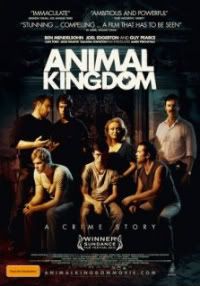 Australia is renowned Australia-wide for being an absolutely fantastic country for churning out movies set in suburbia that are about how awful and mundane life is and how violent it can be to live in even the most innocuous of places. Australian film is made almost entirely of grit; light-hearted movies like Bran Nue Dae are few and far between. As a rule, I stay away from gritty films, because they just don’t float my boat. But Animal Kingdom had received such outstanding reviews from the press and from friends that I decided it was time to launch myself back into the dirty reality of living in Melbourne, where the underbelly of crime is interesting enough that they made a television show about it and then banned it from being shown here. Plus, I do want to support Australian cinema, because one day they’ll make the film adaptation of my Great Australian Novel, right?
Australia is renowned Australia-wide for being an absolutely fantastic country for churning out movies set in suburbia that are about how awful and mundane life is and how violent it can be to live in even the most innocuous of places. Australian film is made almost entirely of grit; light-hearted movies like Bran Nue Dae are few and far between. As a rule, I stay away from gritty films, because they just don’t float my boat. But Animal Kingdom had received such outstanding reviews from the press and from friends that I decided it was time to launch myself back into the dirty reality of living in Melbourne, where the underbelly of crime is interesting enough that they made a television show about it and then banned it from being shown here. Plus, I do want to support Australian cinema, because one day they’ll make the film adaptation of my Great Australian Novel, right?Animal Kingdom is the tale of a criminal family—a film based loosely on the Walsh Street killings, immortalised in book form by Tom Noble (who cameos in the film as a warden) and translated for the screen by David Michod, who also directed and can barely walk now for all the plaudits loaded upon him. Joshua “J” Cody is a teenager who has just lost his mother, and with no one else to turn to, calls his estranged grandmother for help. Smurf, as she is known, takes him in, and thus he is brought into their criminal lifestyle, where violence and drugs are the norm and armed robbery is how they make their income. The cops are watching their homes and everyone is nervous. Throw in a new young member of the family and, frankly, it can’t go well.
This is a good movie, no doubt. It has an all-star cast, with Jacki Weaver as Smurf, Ben Mendelsohn as J’s uncle Pope, an Edgerton as family pal Baz, Guy Pearce as policeman Leckie, and newcomer James Frecheville as Jay. The plot is real and interesting, the locations excitingly, well, local (note: may apply to myself and my nearby readers only) and the script tight. Despite the subject matter, it is never gory or overtly sexual just for the sake of it. But after hearing the words “amazing” and “incredible” used to describe it, I don’t think it could live up to how fantastic it was going to be in my head.
The problem was investment. Not the financial kind—especially as I had a couple of movie vouchers lying around to get me in—but the character kind. With virtually everyone in the film criminals, including some of the police force, I just didn’t care if everyone died. J’s family were all terrible people who killed and stole and were mean to women. J himself kept a blank face devoid of all charm. To be honest, apart from J’s girlfriend’s gloriously normal family, the only person who wasn’t a giant tool of some kind was Guy Pearce’s Leckie, and he had such a bad moustache that I couldn’t muster up the energy to feel for him either. Which is fine—not everyone needs to be charming to be deserving of life—but it meant that tension was lacking, unlike Harry Brown, where you were desperate for Michael Caine’s Harry and Emily Mortimer’s police officer to survive, and every moment with them in danger was spent on the edge of your seat. It was, however, a brilliant portrait of criminal families, and Jacki Weaver’s Smurf is possibly the most reprehensible of them all: a woman who will not dirty her hands with criminal acts but who shamelessly adores her sons and will do anything in her power to keep them happy, manipulating whoever she can to do so.
There are no down-home comfort moments, no times of levity to understand why the family unit is a bearable one. When I was in high school, I went to a friend’s house once to find an unnerving situation: his mother sitting at the dining room table, chopping the marijuana they grew in their backyard into a little bowl, while her sons let out their anger with violence against the walls or the people around them. It was an awkward, bizarre and faintly dangerous situation to me, and while movies can never compare to reality, I felt little of the same anxiousness watching Animal Kingdom that I did that day.
Animal Kingdom is a worthwhile watch, but I didn’t shake with fear or cry, and I bawl in pretty much anything, including ads for Domestic Blitz or similar help-related television shows when the family looks thrilled about whatever’s happened. It doesn’t take much to set me off into emotional turmoil, and I felt strangely distanced from the whole movie. Still, if you love Underbelly, or hearing someone say the phrase “Bridge Road, Richmond” so you can yell at the screen, “I totally go there for coffee sometimes!” then Animal Kingdom is the film for you.


No comments:
Post a Comment
Opinions, opinions! Come one, come all.